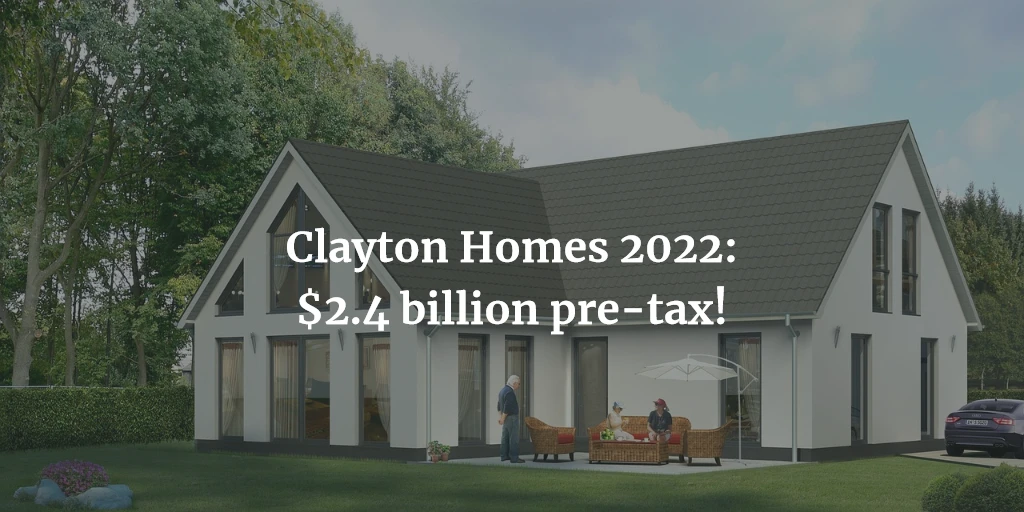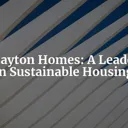Tags: Clayton Homes / earnings
This fanpage is not officially affiliated with Berkshire Hathaway: Disclaimer
Clayton Homes is a powerhouse subsidiary of Berkshire Hathaway. Equally important, Clayton Homes is also the largest builder of manufactured housing and modular homes in the United States, with a market share of over 40%. However, Clayton Homes faces many challenges in the housing market, especially with rising interest rates that affect its financing and insurance businesses as well as demand.
In this article, we will provide an overview of Clayton Homes, its home construction and sales performance, its off-site built homes brand, its financing programs and regulatory environment, and its future prospects. The article is based on Berkshire Hathaway's 2022 annual report .

Overview of Clayton Homes
Clayton Homes is the largest builder of manufactured housing and modular homes in the United States, with over 20,000 employees and a presence in 49 states. Clayton Homes offers a variety of housing options, including site-built homes, off-site built housing, financing, and insurance. Clayton Homes is headquartered near Knoxville, Tennessee, where it was founded in 1956 by Jim Clayton. Clayton Homes has a mission to provide affordable, quality homes for all Americans.
Home Construction and Sales Performance
Clayton Homes, is the largest builder of manufactured housing and modular homes in the United States. In 2022, the company delivered 64,750 homes across the country, facing various market challenges and opportunities. The company also expanded its presence through acquisitions and development of new homesites.
A. Home construction and delivery
Clayton Homes offers both off-site built housing and site-built homes to its customers. Off-site built housing refers to homes that are designed, engineered, and assembled in one of Clayton's 40 home building facilities across the nation, and then transported to the final location. Site-built homes are constructed entirely on the customer's land.
In 2022, Clayton Homes delivered 53,000 off-site built homes and 11,750 site-built homes. The off-site backlog, which represents the value of homes sold but not yet delivered, was at $256 million as of December 2022, down 82% from the prior year. This decrease was mainly due to supply chain disruptions and labor shortages caused by the COVID-19 pandemic. The home order backlog, which represents the value of homes under contract but not yet started, was at approximately $1.4 billion as of December 2022.
B. Acquisitions and expansion
Clayton Homes has been growing its market share and geographic reach through strategic acquisitions and development of new homesites. Since 2015, Clayton Properties Group, a division of Clayton Homes that focuses on site-built housing, has acquired nine builders across 18 states with more than 310 subdivisions. These acquisitions have diversified Clayton's product offerings and customer segments, as well as increased its operational efficiency and economies of scale.
Clayton Homes also owns and controls about 70,000 homesites across the country, which provide a steady pipeline of land for future development. The company has been investing in land development and infrastructure to meet the growing demand for affordable housing.
C. Market challenges and opportunities
Clayton Homes operates in a highly competitive and cyclical industry that is influenced by various economic and social factors. Some of the challenges that the company faced in 2022 were input shortages, labor constraints, rising interest rates, regulatory changes, and environmental issues.
Input shortages and labor constraints began to lessen in the latter half of 2022 as the economy recovered from the pandemic. However, these factors still increased the costs and delays of home construction and delivery. Clayton Homes mitigated these challenges by leveraging its supply chain network, optimizing its production processes, and retaining its skilled workforce.
Rising interest rates slowed down the demand for housing in 2022, especially for higher-priced homes. Clayton Homes responded to this challenge by offering more affordable and energy-efficient homes that appeal to a wider range of customers. The company also benefited from its financing and insurance services that provide flexible and convenient options for home buyers.
Regulatory changes posed both risks and opportunities for Clayton Homes in 2022. On one hand, the company had to comply with various federal and state agencies that oversee the manufactured housing industry, such as the Consumer Financial Protection Bureau (CFPB), the U.S. Department of Housing and Urban Development (HUD), the Government National Mortgage Association (GNMA), and the government-sponsored enterprises (GSEs). These agencies imposed certain standards and requirements on Clayton's products and services that could affect its profitability and reputation. On the other hand, some regulatory changes also created favorable conditions for Clayton Homes, such as the Duty to Serve rule issued by the Federal Housing Finance Agency (FHFA) in 2016, which required the GSEs to support lending for manufactured housing.
Environmental issues also impacted Clayton Homes in 2022. The company faced increased scrutiny from environmental groups and consumers regarding its environmental footprint and social responsibility. Clayton Homes addressed these issues by implementing various sustainability initiatives, such as reducing its greenhouse gas emissions, using renewable energy sources, recycling materials, improving water efficiency, and supporting community development.
Clayton Built® Off-site Homes
Clayton Homes is a leader in off-site home construction, offering a variety of models and floor plans that can be customized to fit the needs and preferences of home buyers. Clayton Homes designs, engineers, and assembles its off-site homes in the U.S., using quality materials and modern techniques. The company's off-site homes are built to meet or exceed federal, state, and local building codes, as well as energy efficiency standards.
Clayton Homes offers two types of off-site homes: manufactured homes and modular homes. Manufactured homes are built on a permanent chassis and transported to the site in one or more sections. Modular homes are built in sections at a factory and assembled on site on a permanent foundation. Both types of homes can be placed on leased or owned land, depending on zoning and financing options.
Clayton Homes' off-site homes have several advantages over traditional site-built homes, such as:
- Faster construction time and lower labor costs
- Reduced waste and environmental impact
- Greater flexibility and customization
- Enhanced quality control and inspection
- Protection from weather and vandalism during construction
Clayton Homes' off-site homes also come with a comprehensive warranty and customer service program, as well as access to financing and insurance options through its subsidiaries. Clayton Homes strives to provide affordable and quality housing solutions for its customers across the U.S.
Financing Programs and Regulatory Environment
Clayton Homes offers a variety of financing programs to help customers purchase their homes. The company has its own mortgage company, Vanderbilt Mortgage and Finance, Inc., which provides loans to customers who buy Clayton Homes products. The company also works with other lenders, such as 21st Mortgage Corporation, a subsidiary of Berkshire Hathaway.
Clayton Homes follows proprietary loan underwriting guidelines that are designed to ensure responsible lending practices and compliance with applicable laws and regulations. The company evaluates each loan application based on the borrower's income, credit history, debt-to-income ratio, and other factors.
Clayton Homes operates in a highly regulated industry and is subject to oversight by various federal and state agencies. Some of the regulatory bodies that affect the company's business are:
- Consumer Financial Protection Bureau (CFPB): The CFPB enforces federal consumer financial laws and supervises certain financial institutions, including mortgage lenders and servicers. The CFPB also issues rules and guidance on various topics related to consumer finance, such as mortgage servicing, fair lending, and disclosure requirements.
- State agencies: Each state has its own laws and regulations governing manufactured housing, such as licensing, installation, safety, and titling. Clayton Homes must comply with the requirements of each state where it operates or sells its products.
- U.S. Department of Housing and Urban Development (HUD): HUD administers the federal Manufactured Housing Construction and Safety Standards Act, which establishes minimum standards for the design, construction, and installation of manufactured homes. HUD also oversees the Manufactured Housing Consensus Committee, which develops and updates the standards.
- Government National Mortgage Association (Ginnie Mae): Ginnie Mae guarantees the timely payment of principal and interest on mortgage-backed securities (MBS) issued by approved lenders, such as Vanderbilt Mortgage and Finance. Ginnie Mae MBS are backed by loans insured by the Federal Housing Administration (FHA), the Department of Veterans Affairs (VA), or the Department of Agriculture's Rural Development (RD) program. Clayton Homes participates in these programs to provide affordable financing options to its customers.
- Government-sponsored enterprises (GSEs): The GSEs are Fannie Mae and Freddie Mac, which provide liquidity to the secondary mortgage market by buying and securitizing mortgages from lenders. The GSEs have recently expanded their support for manufactured housing by purchasing chattel loans (loans secured by personal property rather than real estate) and offering new loan products for manufactured homes titled as real property.
Clayton Homes strives to maintain good relationships with its regulators and comply with all applicable laws and regulations. The company also monitors and responds to any changes in the regulatory environment that may affect its business.
Environmental Compliance and Expenditures
Clayton Homes is committed to building sustainable and attainable homes that comply with environmental regulations and reduce environmental impact. The company regularly makes capital and non-capital expenditures for environmental compliance, such as installing energy-efficient features, recycling or reusing materials, and improving air quality at its facilities.
Some of the energy-efficient features that Clayton Homes offers to its customers include ENERGY STAR® appliances, LED lights, Lux windows with argon, 22-21-50 insulation package and an ecobee® smart thermostat. These features can help lower utility costs, increase comfort and conserve natural resources. Clayton Homes also participates in the ENERGY STAR program through collaboration with the non-profit Systems Building Research Alliance (SBRA), which means that each ENERGY STAR home it builds is capable of being significantly more energy efficient than a comparable home built to code.
Clayton Homes also reduces excess building waste by having exact dimensions and measurements for the majority of its building materials. Many of its facilities strive to recycle or reuse materials such as cardboard, plastic, vinyl siding, scrap wood, scrap metal and more. By building efficiently, Clayton Homes reduces the amount of waste involved in the home-building process.
Additionally, Clayton Homes has achieved ISO 14001 certification for all 40 of its Home Building facilities and 16 of its Clayton Supply locations. ISO 14001 is an international set of standards that specifies the requirements for an effective environmental management system. Clayton Homes applies ISO 14001 criteria to enhance its environmental performance and achieve objectives such as reducing material and natural resource usage, and minimizing waste. ISO 14001 has also led to the improvement of air quality at its facilities by reducing operations-related dust and mitigating process emissions (where applicable).
Clayton Homes is also exploring new technologies for future innovation, such as solar power. In 2022, Clayton Homes unveiled its first net-zero electricity home at the Berkshire Hathaway Shareholders Meeting in Omaha, NE. The home showcases several energy efficiency upgrades and a solar roofing system that allows the home to produce enough electricity to power itself.
Clayton Homes is proud to be part of Berkshire Hathaway Energy’s commitment to social responsibility and net zero greenhouse gas emissions by 2050. The company aims to incorporate sustainability across its business, from the building process to homeownership, and to provide a better tomorrow for its customers and communities.
Financial Performance
Clayton Homes has achieved impressive financial results in 2021 and 2022, despite facing market challenges and rising interest rates.
Here is a summary of Clayton Homes' financial performance in the past two years:
2022 financials
- Revenues: $12.7 billion, up 21.1% from 2021
- Home sales revenue: $10.4 billion, up 25.1% from 2021
- New home unit sales increased 6.2% in 2022
- Factory-built manufactured home unit sales increased 6.0% in 2022
- Site-built home unit sales increased 7.1% in 2022
- Q4 2022 unit sales declined 3.9% from 2021
- Financial services revenues increased 4.7% in 2022 compared to 2021
- Loan balances: $21.3 billion as of December 31, 2022, up $2.5 billion from 2021
- Pre-tax earnings in 2022: $2.4 billion, up 40.7% from 2021
2021 financials
- Revenues: $10.5 billion, up 22.2% from 2020
- Home sales revenue: $8.3 billion, up 26.5% from 2020
- Site-built home unit sales increased 15.8% in 2021
- Factory-built manufactured home unit sales increased 1.5% in 2021
- Financial services revenues increased 7.8% in 2021 compared to 2020
- Loan balances: $18.8 billion as of December 31, 2021, up $1.7 billion from 2020
- Pre-tax earnings in 2021: $1.7 billion, up 35.3% from 2020
These figures demonstrate Clayton Homes' strong growth and profitability in a competitive and dynamic industry.
Future Outlook
Clayton Homes anticipates a decline in earnings in 2023 compared to 2022, due to several market challenges and rising interest rates that affect the demand and affordability of housing. Some of the market challenges include:
- Regulatory uncertainty and potential changes in lending rules for manufactured homes
- Increased competition from other site-built and off-site builders
- Supply chain disruptions and labor shortages that increase costs and delays
- Consumer complaints and negative media coverage that tarnish the company's reputation
However, Clayton Homes also has strategies to navigate these challenges and capitalize on opportunities in the housing market, such as:
- Leveraging its scale and financial strength to offer competitive pricing and financing options
- Expanding its geographic footprint and product portfolio to reach more customers and segments
- Investing in innovation and technology to improve efficiency and quality
- Adopting sustainable and green building practices to meet environmental regulations and consumer preferences
Clayton Homes remains committed to its mission of opening doors to a better life for millions of Americans by providing attainable and affordable housing solutions.
Innovation and Adaptation
Clayton Homes has been at the forefront of innovation and adaptation in the manufactured housing industry. The company has been investing in innovative construction methods and technology to improve efficiency and reduce costs, as well as adopting sustainable building practices and materials to stay ahead of evolving environmental regulations and meet consumer preferences.
One of the key innovations that Clayton Homes has implemented is the use of off-site construction. Off-site construction involves building homes in controlled indoor facilities, where material usage and waste can be monitored and reduced, and where weather delays and damages can be avoided. Off-site construction also allows for greater customization and quality control, as well as faster delivery and installation of homes.
Another innovation that Clayton Homes has embraced is the use of sustainable features and appliances in their homes. The company offers ENERGY STAR® certified homes, which are capable of being significantly more energy efficient than comparable homes built to code, resulting in lower utility costs and environmental impact for homeowners. The company also offers the Energy Smart Home package, which includes features like an ecobee smart thermostat®, upgraded insulation, Low-E windows and a Rheem® dual element water heater. These features help conserve natural resources and reduce energy usage throughout the life of the home.
In addition to these innovations, Clayton Homes has also adopted sustainable building practices and materials that comply with or exceed environmental regulations and standards. All 40 of their home-building facilities and 16 of their Clayton Supply locations are ISO 14001:2015 certified, which means they have an effective environmental management system that reduces material and natural resource usage, minimizes waste, and improves air quality. The company has also partnered with the Arbor Day Foundation® to plant 2.33 million trees in environmentally degraded areas, more than double the number of trees they used to build homes in 2021.
These innovations and adaptations have enabled Clayton Homes to navigate market challenges and expand amid rising interest rates, while also providing quality, attainable and sustainable homes to their customers.
Conclusion
Clayton Homes, is the largest builder of manufactured housing and modular homes in the United States. In 2022, Clayton Homes delivered impressive financial results and operational achievements despite the market challenges and rising interest rates.
Clayton Homes reported revenues of $12.7 billion in 2022, up 21.1% from 2021. Pre-tax earnings in 2022 were $2.4 billion, up 40.7% from 2021. Clayton Homes delivered 53,000 off-site built homes and 11,750 site-built homes in 2022, demonstrating its leadership and innovation in the industry.
Some of the notable achievements of Clayton Homes in 2022 include:
- Received the Manufactured Housing Institute’s 2022 Manufacturer of the Year – Three Plants or More award, Retail Sales Center of the Year for the West region award, and the first-ever Leadership in Sustainability award ClaytonHomes.com.
- Launching the eHome 2.0, a more affordable and energy-efficient version of the eHome brand that was introduced in 2009.
- Expanding its presence in new markets such as California, Colorado, and Florida, where demand for affordable housing is high.
- Enhancing its customer service and satisfaction ratings through digital tools and platforms, such as Clayton Connect, Clayton Studio, and Clayton Care.
Clayton Homes faced some challenges in 2022 as well, such as:
- Increasing costs of materials and labor due to supply chain disruptions and labor shortages.
- Regulatory uncertainties and environmental issues related to land development and zoning.
- Rising interest rates and tightening credit standards that affected consumer financing options.
However, with the support and commitment of Berkshire Hathaway, Clayton Homes was able to navigate these challenges and continue to grow and succeed in its mission of providing quality homes for everyone. Berkshire Hathaway provided Clayton Homes with access to capital, strategic guidance, operational autonomy, and long-term vision.
As we look ahead in 2023 and beyond, we are confident that Clayton Homes will remain a strong and profitable business that creates value for its customers, employees, communities, and shareholders. We are proud of Clayton Homes' achievements and grateful for its contribution to Berkshire Hathaway's success.











